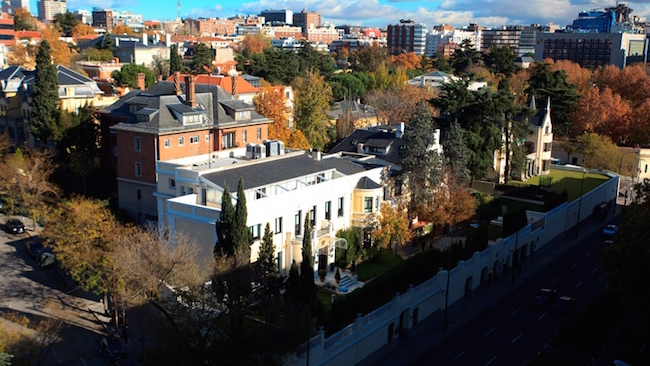IE GAVE 14 SCHOLARSHIP GRANTS TO U.S. STUDENTS LAST YEAR
“When I found out I’d gotten the scholarship, I was frozen to be honest because IE is one of the most prestigious business schools in Europe, if not the world,” believes Handoko, who spent last summer interning in AJE’s Indonesian office. “It was a dream come true because I never expected myself to study abroad without my parents paying something.”
The school also has managed to attract students from the more challenging U.S. market, where it can be a hard sell to convince students to study abroad in Spain for four years, Boehm says. Last year, the schools gave 14 grants to U.S. residents for the BBA or dual degrees including the BBA.
David Handong Lu, a Chinese native who hails from Potomac, Md., is a freshman in IE’s BBA program. He’d been in the U.S. for 13 years when it came time for him to apply to college, and wanted to get out of what he calls the “Americanized mentality” for his undergraduate experience. He took a gap year in Spain after he graduated from high school, and paid a visit to IE’s Madrid campus during that time to take a look at the BBA program.
BENCHMARKING LED TO AN UNUSUAL CURRICULUM
“It was particularly unique in terms of diversity, which I really appreciated” he says. “I’d been in the U.S. for such a long time and love it, but there was something very special about studying in Spain and in such an international setting that I couldn’t resist.”
IE has paid close attention to making sure that its core curriculum, similar in many ways to leading BBA programs around the world, had components that distinguished it in the undergraduate space, and would draw students like Handong Lu to its doors, IE’s Boehm says. The school did a competitive benchmarking of other leading BBA programs in the European and U.S. markets to assess what some of the trends in the marketplace were at the time.
“The number one thing we saw was that more and more undergraduate students were excited about starting their own companies,” Boehm says. “This is an areas where we’ve been strong for 20 years in our Executive MBA and MBA programs, so this was a natural fit.”
MAKING ENTREPRENEURSHIP A KEY PART OF THE PROGRAM
With that in mind, IE administrators designed the BBA so that entrepreneurship would be a key part of the curriculum, weaving it into basic first- and second-year classes, as well as including more specialized electives in the subject for junior and senior year. Even the most basic Management 101 class requires students to build their own companies and come up with a business plan. The school also encouraged professors to teach courses in innovative ways from classroom simulations to analyzing business problems through case studies, much like in an MBA program, Boehm says.
The school’s entrepreneurial focus seems to have had a lasting impact on the students who go through the school. For example, 10% of the most recent graduating class started their own companies, according to the school’s career services office. That’s an exceptionally high level of startups for undergrads, especially when typically only 5% of MBAs choose the startup route.
IE student Pablo Gonzalez has found himself in the international spotlight as founder of Pangea, a platform that seeks to provide young entrepreneurs with events and initiatives that will allow them to have an impact in their home market. This year, Gonzalez organized a conference in Madrid that attracted 200 participants from 65 countries, including many European youth who want to play an important role in the business world.
CREATING A VIBRANT UNDERGRAD PROGRAM IN LESS THAN A DECADE
Another student, Tsering Kenji from Nepal organized a crowdfunding drive within the IE community after the earthquake in his home country this April. That initial effort led him to launch a company called imPACKt Farm, a flat-packed, scalable aquaponic farming unit that can be shipped to individuals in natural disasters and allow them to grow their own food.
The strong entrepreneurial push at IE is fairly unusual for an undergraduate BBA program, and is part of what has helped them build a vibrant undergraduate business program in less than a decade, says Christine Clements, the senior vice president of accreditation and member services at the Association to Advance Collegiate Schools of Business (AACSB). IE’s BBA program holds AACSB accreditation.
In addition, IE is one of only a handful of schools in Continental Europe that offer a BBA exclusively in English, allowing it to quickly become a leader in the European marketplace in this area, agrees Clements, also the organization’s chief diversity and inclusion advocate.
”It’s not to say that no one else does what they do, but maybe they haven’t been as quick to get into it or as innovative about the way they do it,” she adds. “They have become a leader, and I’d expect if they’re doing an English BBA, others will soon follow behind.”
DON’T MISS: STUDENTS FLOCK TO USC’S WORLD BACHELOR’S IN BUSINESS












Questions about this article? Email us or leave a comment below.